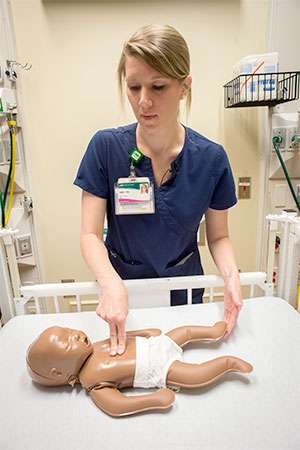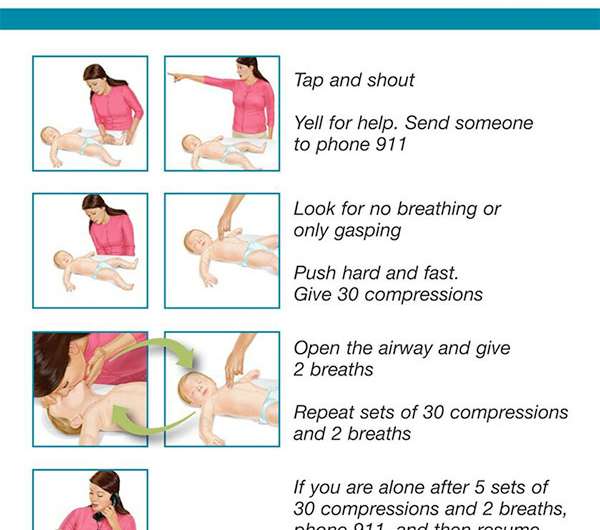Infant CPR kits save lives through training and confidence

Self-instructional CPR kits are a proven method to provide parents with the knowledge and skills needed to resuscitate an infant in case of an emergency. The University of Alabama at Birmingham Women and Infants Center hands out more than 1,500 infant CPR kits each year to help save the lives of infants who are born prematurely, with congenital heart disease or are admitted for respiratory distress and/or neonatal abstinence syndrome. These infants are at higher risk of respiratory and cardiac arrest in their first year of life with bystander cardiopulmonary resuscitation serving as a major predictor of resuscitation outcome.
"In order for UAB to continue to hand out these infant CPR kits at no charge to patients, we need support from donors," said Elicia Jacob, DNP, director of Nursing for UAB Women and Infants Services. "Through our educational classes and these CPR kits, we hope to give parents and caretakers confidence to perform CPR on their infant in case of an emergency."
UAB Women and Infants Center is launching a fundraising campaign to raise money to help educate families on how to perform infant CPR in case of an emergency at home and provide the infant CPR kits, which retail for $39.99, complimentary when leaving the hospital.
"In order to continue to save infant lives and hand out these kits for free, we need your help," Jacob said. "The kit allows parents to practice CPR on an infant, as well as teach family and friends who will be caring for the infant how to perform CPR."
Once an infant is stable, the care team at UAB's Regional Neonatal Intensive Care Unit shifts their focus to parent education and patient care class. Educating the parents of infants on how to perform CPR gives them confidence, a "can do" attitude, and the willingness to step forward and save an infant's life.

As part of this program, the nursing staff teaches parents how to perform CPR in a comfortable, informal setting. Parent care classes at UAB also help prepare new parents for the unthinkable, such as their infant going into cardiac arrest.
UAB nurses then send families whose infant has a high risk of respiratory or cardiac arrest home with an educational infant CPR kit that consists of a mini baby mannequin with lungs for practice, a 22-minute how-to DVD and written instruction on performing CPR on an infant. The kits can be used as practice or to teach others who will be caring for the infant how to perform CPR in case of an emergency.
"Our greatest hope is that parents will never need to use this skill, but in an emergency, will know what to do to save their baby's life," Jacob said.
In case of an emergency, it is important to phone 911 first, then proceed with the following steps when administering CPR to an infant:
- Check for response by tapping the infant's foot
- Open airway, check breathing
- Give two breaths, then push on chest 30 times
- Repeat sets of breaths and pushing the chest
- If alone after 5 sets, phone 911; then resume CPR
If an infant is chocking, remember to support the head and neck rest your arm on your lap or thigh, then:
- Hold the infant facedown
- Give up to five back slaps
- Turn the infant face up. Push on the chest five times
- Repeat sets of back slaps then pushing the chest (steps 2 and 3) until object comes out and the infant can breathe, cough or cry
- If the infant stops responding, send someone to call 911 and begin the steps of CPR, looking in the mouth each time you open the airway and remove the object, if seen




















